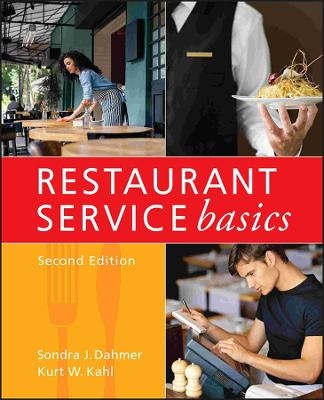
Restaurant Service Basics
John Wiley & Sons Inc (Verlag)
978-0-470-10785-0 (ISBN)
An excellent training tool for both hospitality programs and working restaurant managers, Restaurant Service Basics, 2nd Edition considers the entire dining experience in situations ranging from formal to casual. Step-by-step instructions guide readers through service functions. Different types of service: French, American, English, Russia, Family-style, and Banquet are explained in detail, along with universally important safety, sanitation, and emergency procedures. This Second Edition features end-of-chapter projects that incorporate real-life situations, as well as enhanced coverage of point-of-service and other technology use in restaurants.
SONDRA J. DAHMER has taught at numerous hospitality and foodservice programs. KURT W. KAHL, MS, RD, CD, LD, is a Registered Consultant Dietitian and trainer in the areas of foodservice and nutrition. Together, Dahmer and Kahl have trained waitstaff on service skills and have helped experienced servers polish their skills.
Preface ix
Chapter 1: The Server 1
Objectives 1
Service and Hospitality 2
Advantages of Being a Server 2
Qualifications for the Job 4
Personal Appearance on the Job 6
The Uniform 6
Hygiene and Grooming 8
Your Role in the Restaurant Organization 8
Teamwork with Coworkers and Supervisors 9
Issues Regarding Restaurant Employment 11
Respecting the Diversity of All People 11
Preventing Harassment on the Job 12
Keeping Violence and Drugs out of the Workplace 12
Safety and Preventing Accidents 13
Taking Sanitation Seriously 13
Key Terms 14
Review 14
Projects 14
Case Problem 15
Chapter 2: Types of Establishments, Types of Service, and Table Settings 17
Objectives 17
Types of Establishments 18
Types of Table Service 18
French Service 18
Russian Service 21
English Service 22
American Service 22
Banquet Service 25
Family-Style Service 28
Buffets 28
Salad Bars, Oyster Bars, and Dessert Tables 30
Key Terms 33
Review 33
Projects 34
Case Problem 34
Chapter 3: Before the Guests Arrive 35
Objectives 35
Station Assignments 36
Reservations 36
Dining Room Preparation 38
Preparing the Tables 38
Folding the Napkins 41
Preparing the Sidestand 41
Studying the Menu 46
What Is a Menu? 46
Why Study the Menu? 46
Types of Menus 48
Content of the Menu 48
Methods of Food Preparation 53
Preparation Time 54
Meal Accompaniments 55
Closing the Dining Room 56
Key Terms 58
Review 58
Projects 59
Case Problem 59
Chapter 4: Initiating the Service 61
Objectives 61
Seating Guests 62
Who Seats Guests? 62
Where to Seat Guests 62
How to Seat Guests 63
Controlling Seating 64
Approaching the Guests 65
Taking Orders 65
Technique of Taking Orders 65
Methods of Taking Orders 67
Appropriate Topics of Conversation 70
Answering Questions 70
Making Suggestions and Increasing Sales 71
Timing the Meal 73
Placing Orders in the Kitchen 73
Picking up Orders from the Kitchen 75
Key Terms 76
Review 76
Projects 77
Case Problem 77
Chapter 5: Serving the Meal 79
Objectives 79
Serving Tables and Booths 80
Serving Each Course 80
Serving Beverages 82
Serving at Booths 84
Clearing Dishes from the Table 84
Efficiency When Serving 86
Minimizing Steps 86
Maintaining Food Quality 86
Attending to Guests 86
Giving Special Amenities 86
Handling Unusual Circumstances 87
Your Behavior toward All Guests 87
Handling Guests with Special Needs 87
Handling Complaints 89
The Guest Check and Payment 90
Receiving the Tip 92
Increasing the Tip 95
Reporting Tips 95
Key Terms 97
Review 97
Projects 98
Case Problem 98
Chapter 6: Safety, Sanitation, and Emergency Procedures 99
Objectives 99
Safety: Preventing Accidents 100
Food Safety and Sanitation Responsibilities 103
Emergency Procedures 107
Fire 108
Severe Weather 108
Electrical Blackouts 109
Injury or Serious Illness 109
Key Terms 113
Review 113
Projects 113
Case Problem 114
Chapter 7: Handling Service Using Technology 115
Objectives 115
Computers in Restaurants 116
Components of a POS System 118
Office Computer 118
Server Terminal with Touch Screen Monitor 118
Printer 120
Cash Drawer 120
Magnetic Card Reader 120
Handheld Order Terminal 121
Taking Orders Using a POS System 122
Getting Orders to and from the Bar and Kitchen 124
Completing Each Transaction 124
Closing at the End of the Day 126
Advantages of a POS System 128
Advantages and Disadvantages of Handheld Order Terminals 129
Restaurant Reservations and Table Management 130
Advantages of Restaurant Reservation and Table
Management Software 130
Guest Paging 131
Advantages of Guest Paging 132
Key Terms 134
Review 134
Projects 134
Case Problem 135
Chapter 8: Wine and Bar Service 137
Objectives 137
Significance of Serving Wine, Beer, and Liquor 138
The Concern about Serving Alcohol in Restaurants 139
Wine Service 141
Wine Merchandising 141
Characteristics of Wine 141
Types of Wines 143
Temperature of Wine 143
Wines and Foods that Complement Each Other 145
The Amount of Wine to Order 145
Wine Glasses 145
Wine Lists and Wine Charts 147
Taking the Wine Order 148
Procedure for Opening and Serving Wine 148
Beer Service 154
Types of Beer 154
Types of Beer Glasses 155
Procedure for Serving Beer 156
Liquor Service 156
Types of Liquor 156
Temperature of Drinks 157
Liquor Glassware 157
Popular Cocktails and Mixed Drinks 158
Procedure for Serving Drinks 158
Nonalcoholic Drinks 161
Key Terms 163
Review 163
Projects 164
Case Problem 165
Resource A: Definitions of Key Terms from the Text 167
Resource B: Definitions ofMenu and Service Terms 177
Resource C: Recommended Resources for Further Information 189
Index 191
| Zusatzinfo | Photos: 59 B&W, 0 Color; Drawings: 28 B&W, 0 Color |
|---|---|
| Verlagsort | New York |
| Sprache | englisch |
| Maße | 185 x 229 mm |
| Gewicht | 363 g |
| Themenwelt | Wirtschaft |
| Weitere Fachgebiete ► Handwerk | |
| ISBN-10 | 0-470-10785-5 / 0470107855 |
| ISBN-13 | 978-0-470-10785-0 / 9780470107850 |
| Zustand | Neuware |
| Haben Sie eine Frage zum Produkt? |
aus dem Bereich


